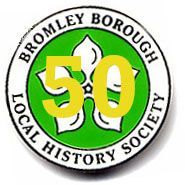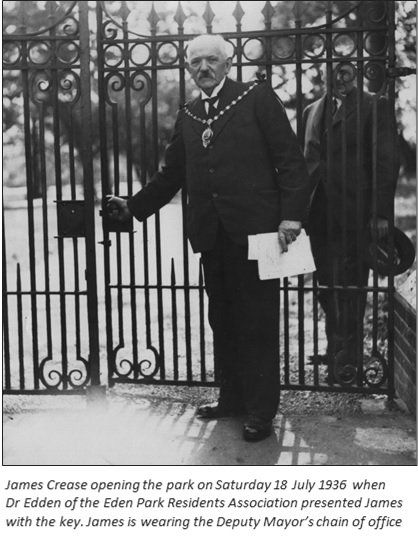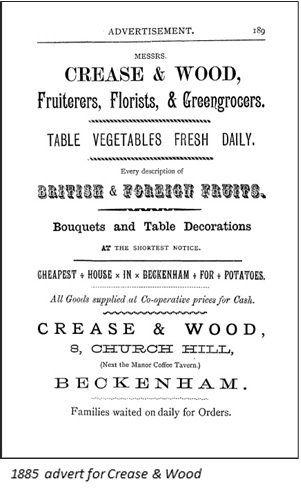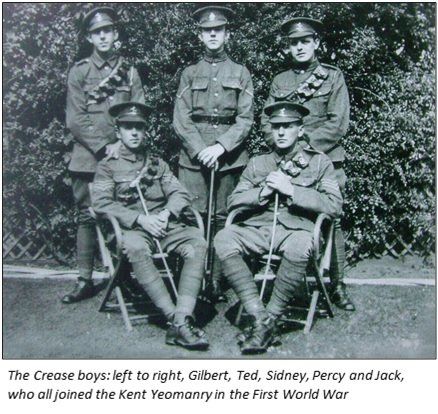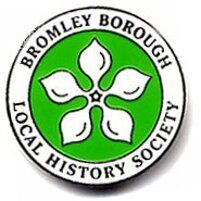By Pat Manning
In the 1930s developers were tearing up the parkland and countryside of the great country estates on the edges of London and in Beckenham William Eden’s Eden Farm and parkland was disappearing under row after row of mock-Tudor-style houses, selling for around £800 each.
But not everyone in Beckenham was happy to see every square inch of soil going for commercial gain. James Crease, a councillor for the Eden Park ward of Beckenham Urban District Council, campaigned successfully for a green lung, a memory of the old Eden Park Estate, to be kept.
Lying between Village Way and Wellhouse Road, the park was opened by Alderman Crease in 1936. It preserves a small part of the estate where the great house once stood and it bears his name — Crease Park.
James Crease was not from Beckenham, although he came to serve the town both as a trader and councilman for many years. He was born in 1859 in Westbury, Somerset, married Edith Joanna Cooper in Islington in 1884 and moved to Beckenham soon afterwards. Their five sons were all born in the town — Edwin Hugh 1887, Percy Vivian 1889, John Stanley 1890, Gilbert 1891 and Sidney Herbert 1893.
An advertisement in the 1885 Beckenham directory shows James Crease in business as a fruiterer on Church Hill. The shop was Crease and Wood but by the next year it was Crease alone. Shortly afterwards the shop became 43 High St, due to re-numbering, and this is where the family grew up.
Very soon after he arrived, James Crease was taking an active part in local politics serving as a councillor from 1898-1936 and in 1904 was responsible for General Purpose, which must have covered a wide range of responsibilities. In those days work as a councillor was unpaid.
As well as his council work, James was a keen supporter of the Beckenham Swimming Club and was pictured with Robert Borrowman, the author of Beckenham Past & Present, at the swimming club dinner at the Railway Hotel in the early 1900s.
Eventually, in 1927 when James was 68, the greengrocer’s shop was sold and became the sports shop, Furley & Baker, which still trades there today.
Three of his sons worked for the council. John — who was also well known as a footballer — was deputy borough treasurer, Gilbert was deputy borough education officer and Sidney was physics master at the Beckenham & Penge Grammar School. All five boys served in the First World War in the Kent Yeomanry and survived unhurt.
By the time of his retirement James had moved to Mertonholme at 30 Wickham Way. His grandson Gerald Crease, the only child of Percy and Betty Crease, remembers going home to his grandfather’s house after being in the Beckenham Cottage Hospital suffering from scarlet fever. He recalls a large garden that stretched down to Court Downs Road where a little wicket gate provided a short cut to the High Street. His father kept chickens there, sometimes as many as 200, collecting food waste from the residents of Wickham Road in a wheelbarrow.
Gilbert Crease, another of James’s five sons, had been removing incendiaries from the roof of a house when the bomb fell opposite the end of Court Downs Road on the night of 16-17 April 1941. It killed four firemen and sliced off Gilbert’s foot. Percy had previously received a severe head injury from shrapnel when a bomb fell at the junction of Crystal Palace Park Road and Thicket Road on 18 October 1940. The Second World War proved more dangerous to the brothers than First World War.
James Crease was presented with the Freedom of the Borough of Beckenham in1936. He had served on the council for 38 years, becoming an Alderman and, in 1935, the first Deputy Mayor. That same year, 1936, he officially opened Crease Park.
The casket containing the Freedom scroll is in the care of his grandson James Crease, son of Edwin who was James’s eldest son. The oak of the casket originated in old oak beams either from the old police station or the Manor House opposite St George’s church. James also has the original illuminated scroll (a black and white copy of which is in the Phyllis Teare archive in Bromley Local Studies Library).
The only other casket made at this time was for Councillor Josiah Stamp when he became a borough Freeman but it is likely that his casket was lost when his house was bombed and Josiah was killed on 16 April 1941.
James died in 1943 but the memory of his tireless work for the people of Beckenham lives on in the welcome patch of green among the housing development of Eden Park — Crease Park.
